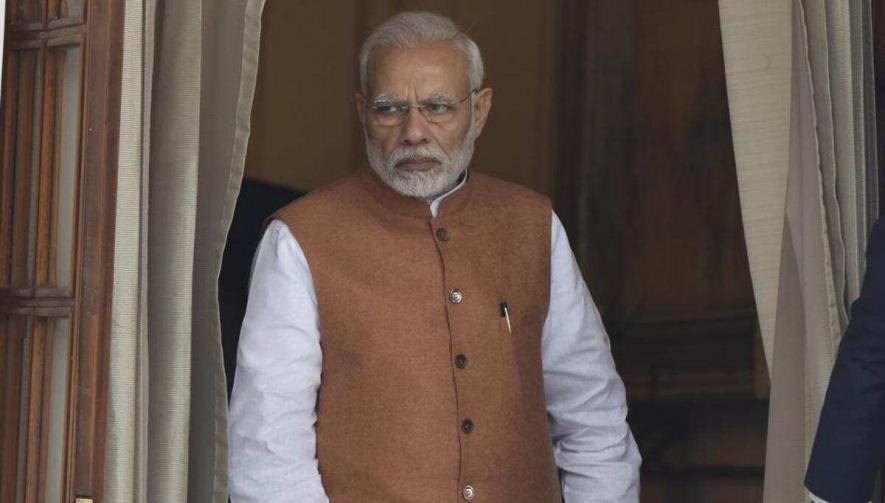Can Opposition Rout Modi’s Welfare Narrative?

Image Courtesy: Hindustan Times
It is possible that what the opposition parties could not offer in terms of a new mood, fresh narrative and robust ethical critique of the current regime, the pandemic will deliver, In his latest, though lacklustre, words, Prime Minister Narendra Modi acknowledges of the need for planning, policy and institutions, which opposition parties could not emphasise on. But Modi still looks ineffective because we are staring at a real-time social and economic crisis, which cannot be wished away with slogans and coining rhyming acronyms.
Even the kind of theatre that Modi created in earlier rounds require a suitable narrative and cultural symbolism. Mere theatrics without the right symbolism does not work. Slogans without governance have short shelf-life.
We face a situation in which the economy has to be revived without slackening the lockdown and the fight against the coronavirus. This needs coordination and not the heroism of a single individual. Modi as the sole decision-maker is beginning to create more panic than jubilation.
There are sudden reminders that we need state governments that play a responsible role and not a unipolar Centre that disregards and disrespects the political leadership in the states. Though Modi has been trying to push the buck to the states, he cannot do this while also wanting to take credit for the steps taken during the lockdown. Modi does not seem to know how to move forward. It is becoming clearer that he is unwilling to take responsibility, but wants singular focus on himself.
The ongoing pandemic has also created a mood of social pathos; there is a need for hope, solidarity and compassion. This government is weakest in negotiating such aspects. The futility of social conflict is also dawning, in light of the prolonged continuation of the pandemic. The Home Minister has been missing in action because provocations are not working while the means for fostering solidarity are not known. The futility of conflict can hit hard, albeit in silent ways, the very strategy on which right-wing political mobilisation is based. Victimising and conspiracies cannot connect—even if they partially did—when there is a threat to the very social order on which everyday life is based.
It is precisely to counter this lack of connect that the Prime Minister came up with the emphasis on “self-reliance”. It is a welcome move, though it is yet to be seen how this is relevant in the current context. Further, self-reliance again requires cooperation, while what the Right compulsively requires is an idea of solidarity against a perceived enemy. Where and who is the enemy? The virus cannot count for one, nor can it sustain the kind of polarised solidarity that the right-wing generates. It could be that either Muslims or China will be picked as the “enemy”. But even they would possibly work only if our systems of healthcare were in place. With a humongous ongoing migrant crisis, blaming the Muslims or China looks a tad unconvincing.
Right-wing politics in India has consistently moved to a slim agenda of creating hysteria. Much of its strategies are geared to this end. The middle class will, by far, remain the most important player, because it knows where its interests lie and also because it forms the social base for nationalism. But even the middle class looks confused. It is puzzled about how to be nationalistic when the economy is slipping and the human crisis of migrant exodus will also have an adverse impact on its everyday life.
A strong economy and opportunities for mobility are preconditions for middle class nationalism. They can afford to sideline, or remain silent about, Dalits, migrants and Muslims so long as their own life chances remain unaffected, but today that is not the case. Today their own jobs are at risk; there are salary cuts, the dearness allowance is being slashed and their children’s education is under stress. Today communal polarisation might be a good way to vent their frustration, but it will not serve their interests. An at least modest momentum in the economic is a precondition for truly toxic communal propaganda. Yet, the Modi government had shifted gears to espouse an exclusive Hindutva agenda far too long ago: it slipped in many Assembly elections precisely for this reason.
It has now been riding at the Centre on the basis of Modi’s continued popularity and manufactured conflicts. Today the pandemic seems to be gradually eroding even the social space that this strategy of the right-wing requires. The civic crisis created by the pandemic is much bigger and more real than any manufactured majoritarian crisis. The government knows the game it is playing by introducing more neo-liberal reforms and heightened state control. As expected, it has initiated the Aarogya Setu for surveillance and amended labour laws, but the issue at hand is how to maintain legitimacy.
This is where Modi has shifted gears to a welfare orientation, self-reliance and emphasis on the local, which combines the optics of welfarism with an illiberal dose of nationalism.
In the theatre of politics it is to be seen how the poor respond to this dose of welfarism. The discourse has suddenly moved from globalisation to “local is vocal”. A similar pitch was made earlier with Make in India, but that got waylaid. Given the trust Modi enjoys, the vacuum in political leadership and lack of a unified Opposition narrative, this gives him the space to shift narratives and it will also create a new-found credibility for welfarism.
Opposition parties need to build on this now and further push the welfare discourse in order to counter majoritarian politics. But most parties have no other imagination than that of growth. If they can gather momentum for issues such as basic income, more allocations to health and education there could be formidable shift in the political dynamics. Even champions of neo-liberal welfare such as former finance minister P Chidambaram have been emphasising the significance of schemes such as Nyay of late, which he would have opposed were he the finance minister.
Mere critiques of Modi while operating within the limits of growth-centric discourse would be unhelpful. This pandemic has created a real-time space and pressure to move back to the commons and the idea of public goods as a feasible mode of solidarity. Will the Opposition seize the opportunity?
The author is associate professor, Centre for Political Studies, JNU. His edited volume, Secular Sectarianism: Limits of Subaltern Politics, was published recently. The views are personal.
Get the latest reports & analysis with people's perspective on Protests, movements & deep analytical videos, discussions of the current affairs in your Telegram app. Subscribe to NewsClick's Telegram channel & get Real-Time updates on stories, as they get published on our website.
























